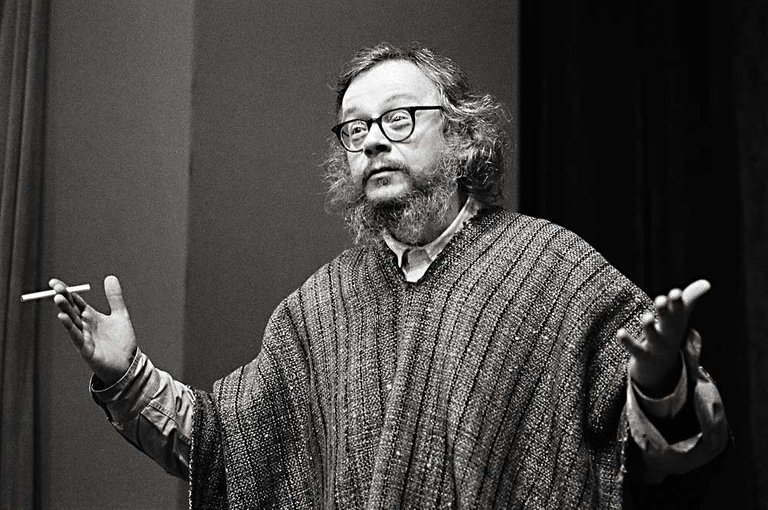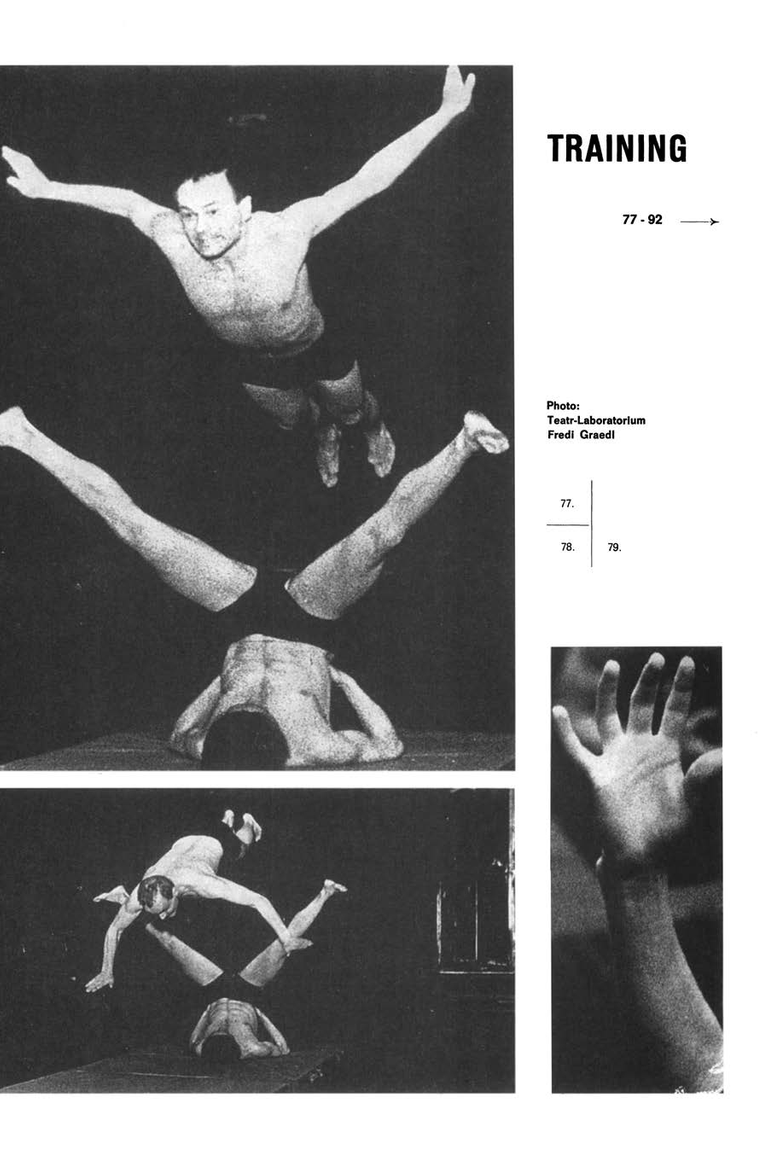[ESP]
Quiero compartir un poco sonbre la historia de una persona que revolucionó el mundo del teatro. Antes de él, ya existía el ritual, el trance y las ceremonias, como parte importante de las civilizaciones. Aún hoy en día quedan algunas que comprenden el poder de la palabra y el cuerpo, como un portal que da vida al presente.
Este hombre logró sumar al teatro contemporáneo: el ritual. Y quizo construir una forma que conectara el hombre a sí mismo (al todo y la nada, diría yo). Y quien haya practicado sus enseñanzas, aún por muy superficial que haya sido, seguro comprenderá un poco lo que estoy contando. Para quienes no lo conozcan, sepan que su nombre guarda pragmatismo, misterio y dejó una vertien más para el teatro mundial: Jerzy Grotowski.
Su escuela tiene sus bases en la tradición de Stalisnavski. Estudió sus enseñanzas, se hizo las mismas preguntas que éste, pero llegó a conclusiones distintas, conectó con una nueva posibilidad de explorar y potenciar, las capacidades creativas y transformadoras de la persona.
Stalinavski se preguntaba muchas cosas sobre el teatro, una de ellas : ¿De qué está compuesto el teatro? Grotowski respondió de esta forma: Para que exista una obra de teatro debe haber lo fundamental: el intérprete y el público. Todo lo demás es accesorio. El cuerpo es el primer exponente de todo el universo que puede narrar un hombre, y desde esas premisas, nace lo que el llamaría el Teatro Pobre. Pobre de trajes elaborados, pobre de escenografía, de luces y maquinaria, para quedarse con la escencia del hecho teatral: el hombre, mostrando la tragedia humana.
He conocido un poco de sus enseñanzas, solo un poco. Hace varios años se realizó una Cátedra con su nombre en la Universidad Nacional Experimental de las Artes. Para otro momento les contaré de ese preceso que viví. Lo que puedo adelantar es que siento gran admiración por su escuela, es evidente.
Quiero dejarles acá un poco de su biografía y un libro que puede ser un buen lugar para conocerlo.

Jerzy Grotowski, nació en Polonia (1933-1999), una ciudad de atmósfera mística, enigmática, dicho por él mismo. Profundamente religiosa, este entorno lo marcaría desde joven, los primeros libros que recuerda le marcaron la curiosidad por el sentido de la vida y que uno que leería a escondidas fue la biblia (Flazen-Grotowski, 2010).
Gran lector, desarrolló un método donde se busca llevar al máximo las capacidades psicofísicas del actor, le llamó la vía negativa. “Lo mío no es una colección de técnicas, sino la eliminación de obstáculos” (1992, p.11). Con ella buscaba responder sus investigaciones respecto a ¿qué es el teatro? ¿Y qué lo diferencia de otras artes? Llegando a prescindir desde la resolución a estas preguntas y de todos los elementos superfluos de la escena teatral, luces, vestuario, escenografía, música, se quedaría con lo que consideró lo imprescindible del acto teatral, sin lo cual no puede ocurrir: el actor y el espectador. Sin estos dos la creación es inexistente. Nacería con ello el Teatro pobre.
Busca una nueva moralidad, un nuevo “código del artista” (Grotowski, 1992). Donde la persona se expusiera a una desnudez total, sin regodeo, sin ego, donde mostrará su vitalidad desde la profundidad de su cuerpo, desde los orígenes de los impulsos vivos del cuerpo, no mecánicos, sino nacientes desde las fajas más profundas de la presencia humana.
Desarrolló una trayectoria de 30 años y un poco más, atravesando en este camino lo que él llamará: el Teatro de los espectáculos, el arte como representación, pasando por el Parateatro, con participación de gente del exterior, el Teatro de las fuentes, la búsqueda de la fuente en las diferentes técnicas tradicionales y por último el arte como vehículo, donde se concentra el trabajo sobre los detalles, el rigor, la precisión— (Grotowski, 1993)
Esta última investigación de su trabajo teatral, lo llevó a desarrollar dos metodologías prácticas para dar con esta desnudez total del actor: Los ciclos físicos, el terreno donde se busca que la persona se pueda sobrepasar así misma y el ciclo plástico, donde se investiga la precisión, los detalles en el movimiento (Grotowski, 1993).
El Training del actor, como lo llamara Grotowski (1993), el campo donde se ponen en práctica el ciclo físico y plástico, es un trabajo constante, guiado, principalmente grupal, diario, disciplinado, que busca el desbloqueo de las resistencias del cuerpo, logrando así sobrepasar los límites de la gravedad y el espacio. ¿Cómo trabajó estas premisas? Por medio de la vía negativa, esto es lograr eliminar las resistencias físicas, los bloqueos que se pone el actor por medio de ejercicios que sean un reto, casi imposible de alcanzar, pero al momento de lograr realizarlos, logre recobrar la confianza en sí mismo, en sus propias capacidades.

A dónde quiere llegar Grotowski con este método, que el actor logre dar con los “impulsos internos”, “una reacción viva”, que dé con un individuo develado en escena, con “una expresión íntima”, donde se pueda manifestar el germen creativo del individuo.
A todas las personas que nos han legado la antorcha: el conocimiento Gracias
I want to share a little about the story of a person who revolutionized the world of theater. Before him, ritual, trance and ceremonies already existed as an important part of civilizations. Even today there are still some who understand the power of the word and the body, as a portal that gives life to the present.
This man managed to add to contemporary theater: the ritual. And he wanted to build a form that would connect man to himself (to everything and nothing, I would say). And whoever has practiced his teachings, no matter how superficial it may have been, will surely understand a little of what I am telling. For those who do not know him, know that his name keeps pragmatism, mystery and left one more side for the world theater: Jerzy Grotowski.
His school has its foundations in the Stalisnavski tradition. He studied his teachings, he asked himself the same questions as him, but he reached different conclusions, he connected with a new possibility of exploring and enhancing the creative and transforming capacities of the person. Stalinavski wondered many things about the theater, one of them: What is the theater made of? Grotowski responded in this way: For a play to exist there must be what is fundamental: the performer and the audience. Everything else is accessory. The body is the first exponent of the entire universe that a man can narrate, and from these premises, what he would call the Poor Theater was born. Poor of elaborate costumes, poor of scenery, lights and machinery, to stay with the essence of the theatrical fact: the man, showing the human tragedy.
I have known a little of his teachings, just a little. Several years ago a Chair was held with his name at the National Experimental University of the Arts. For another moment I will tell you about that process that I lived. What I can say is that I feel great admiration for your school, it's obvious. I want to leave you here a bit of his biography and a book that can be a good place to meet him.

Jerzy Grotowski was born in Poland (1933-1999), a city with a mystical, enigmatic atmosphere, according to himself. Deeply religious, this environment would mark him from a young age, the first books he remembers marked his curiosity about the meaning of life and that one he would secretly read was the Bible (Flazen-Grotowski, 2010).
A great reader, he developed a method that seeks to maximize the psychophysical abilities of the actor, he called it the negative path. "Mine is not a collection of techniques, but the elimination of obstacles" (1978, p.11). With it, he sought to answer his research regarding what is theater? And what differentiates it from other arts? Dispensing from the resolution of these questions and all the superfluous elements of the theatrical scene, lights, costumes, scenery, music, he would be left with what he considered essential for the theatrical act, without which it could not happen: the actor and the viewer. Without these two creation is non-existent. The Poor Theater would be born with it.
He seeks a new morality, a new "artist's code" (Grotowski, 1992). Where the person exposes himself to total nudity, without gloating, without ego, where he will show his vitality from the depth of his body, from the origins of the body's living impulses, not mechanical, but born from the deepest girdles of presence human.
He developed a career of 30 years and a little more, traversing on this path what he will call: the Theater of shows, art as representation, passing through the Paratheatre, with the participation of people from abroad, the Theater of the sources, the search for the source in the different traditional techniques and finally art as a vehicle, where work is concentrated on details, rigor, precision— (Grotowski, 1993)
This last investigation of his theatrical work led him to develop two practical methodologies to find this total nudity of the actor: The physical cycles, the terrain where it is sought that the person can surpass himself and the plastic cycle, where the precision, the details in the movement (Grotowski, 1993).
The Actor's Training, as Grotowski (1993) called it, the field where the physical and plastic cycle is put into practice, is a constant, guided, mainly group, daily, disciplined work that seeks to unlock the body's resistance, thus managing to exceed the limits of gravity and space.
How did you work these premises? Through the negative path, this is to eliminate the physical resistance, the blockages that the actor puts on himself through exercises that are a challenge, almost impossible to achieve, but at the moment of achieving them, he manages to regain confidence in himself , in their own capacities.

Where does Grotowski want to go with this method, that the actor manages to find the "internal impulses", "a live reaction", that he finds an individual revealed on stage, with "an intimate expression", where the creative germ can be manifested of the individual.
To all the people who have inherited the torch from us: knowledge Thanks
yuri.ccs🌷
Mis enlaces
Referencias
Instituto Nacional de Audiovisual (Prod.) y Dziewulska M. (Guionista y Directora) (2010). Grotowski-Flaszen [documental]. Polonia: Instituto Nacional de Audiovisual.
Grotowski, J. (16° ed. 1992). Hacia un teatro pobre. México: Siglo XXI
Máscara. Cuaderno Iberoamericano de reflexión sobre escenología. Año 3, Nº 11-12, 1993, pp. 4-78. Grotowski (1993). México, editado por Escenología, A.C.
S/a. (s/f) . Jerzy Grotowski. Foto. Fuente
Graedi, F. (sf) . Training. Foto. Fuente
Muy buen post para dar a conocer a esta figura central, entre otras, del quehacer artístico del siglo XX, que transformó en gran medida el teatro contemporáneo, o quizás lo revitalizó por el rescate de lo ancestral, lo que está en el origen del teatro. En ese sentido, cabe preguntarse acerca de la relación que pudo tener la propuesta de Grotowski con la visión de Antonin Artaud en El teatro y su doble.
Conocí algo de Grotowski a través de dos amigos teatreros, uno ya fallecido (Carlos Brito) y otro que vive en México desde varios años (Armando Holzer), quienes trataropn de aprovechar aspectos de la visión de Grotowski en el teatro que hacían entonces (hablo de los años 80). Gracias por tu post, bien fundamentado, @yuri.ccs. Saludos.
Grotowski el gurú del teatro